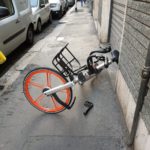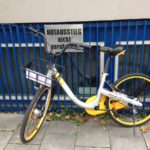European Market Situation
Since the summer of 2017, Chinese dockless bike sharing models have also penetrated into the European market. In a statement, ofo claimed that their goal is to penetrate the global bike market and to make bike ownership obsolete (see here). oBike has made a similar statement wishing to achieve social equity for bicycles (see here)
In addition to the Chinese operators also several European start-ups have emerged such as the German Byke (see here), Irish Urbo Solutions and Bleeper Bikes, Belgian Cloudbike and mobit, Czech Rekola , British YoBike and Pony Bikes (see here) and Danish Donkey Republic.
They encounter similar problems of vandalism but generally have more reliable maintenance teams and work more closely with city officials.
As a result national cyclist and industry associations are starting to publish their own targeted position papers such as ADFC, ZIV, Pro Velo Switzerland and Radlobby.
PRC’s dockless bike share systems can currently be found in numerous European cities and the number keeps growing (see here, here). However as of 2018 many bike share operators have scaled back their European operations. Besides Europe, the Chinese dockless bike share operators have already launched their operations in North America and they are planning to enter the South American market, namely in Mexico, in February 2018 (see here).
For a list of European cities that have or hadsuch dockless bike sharing programs click here.
To have an overview what is going on across Europe countries have a look below.
Austria
Vienna
oBike from August 2017 until October 2018 with up to 500 bikes
ofo from August 2017 until August 2018, introduced 3 gear systems into their Austrian bikes
During the winter the number of ofo bicycles was reduced from 700 to 200 due to reduced usage of the bikes (see here).
After several problems with the providers, the city is now working on a regulation to improve the service and the parking of bikes (see here). The mobility agency Vienna already did a first step into this direction and published tips on how to properly park the dockless bikes (see here).
Belgium
Brussels
oBike from September 2017 until June 2018 with about 500 bikes but without a permission from the city (see here)
GobeeBike since October 2017, not available in the complete Brussels region but only in limited municipalities, due to too much vandalism they left the city in January 2018 (see here) but there ere delays in removing the bikes and they were threatened with fines (see here)
While drafting a regulation scheme for dockless bike sharing the region of Brussels also asked citizens for their opinion.
Czech Republic
Prague
ofo from October 2017 until July 2018 with around 300 bikes (see here)
France
Paris
oBike from November 2017 until October 2018 with up to 700 bikes
ofo from December 2017 until December 2018 with up to 1,000 bikes by the end of the year (see here and here)
mobike since January 2018 with 4,000 bikes (see here and here)
Paris implemented a memorandum of understanding for free floating bike sharing in June 2018 stating that parked bikes should not block sidewalks and that all broken bikes need to be removed within 48 hours failing which there will be a fine (see here).
Lille
GobeeBike from October 2017 until the beginning of 2018, vandalism and theft have occurred since the beginning (see here)
Reims
GobeeBike from November 2017 until January 2018, in January 2018 380 out of 400 bikes had been stolen or were too damaged to be used (see here)
_______________________________________________________________________________________________
In January 2018 it was announced that GobeeBike would leave Lille and Reims as 80% to 90% of their fleet had been vandalized or stolen (see here, here and here). In February 2018 GobeeBike completely stopped operating in France due to too much vandalism (see here).
Germany
Munich
oBike from August 2017 until August 2018, suddenly 7,000 bikes could be found in the city without the permission of the city which lead to unhappiness of citizens and many dumped bikes (see here). In March 2018 it was announced that 6,000 of those bikes would leave the city due to too much vandalism (see here).
Frankfurt
oBike from October 2017 until August 2018
LimeBike since December 2017
In December 2017 the city of Frankfurt published a new regulation with 10 rules for shared bikes due to partially unacceptable conditions of bikes or their parking location (see here).
Berlin
oBike from November 2017 until July 2018, started with 688 bikes (see here)
mobike since November 2017, with 5,000 bikes (see here)
Lime Bike since April 2018 with 1,000 bikes (see here)
ofo from April 2018 until July 2018, with 2,000 bikes that were especially developed for the German market (see here)
Authorities demand that a license system should be introduced in case too many operators take up the same space. In addition, there should be the possibility of towing the bikes if an overcapacity or illegal parking is noticed (see here).
The city in general is skeptical if the dockless bike sharing will succeed as there are already enough and better equipped bikes available in the city. In addition, there is the assumption that the bikes are only there to gather data (see here).
Hannover
oBike from November 2017 until August 2018, started with 500 bikes (see here)
Kiel
ofo from February 2018 until July 2018, started with 1,500 bikes that can go up to 3,000 (see here)
Düsseldorf
mobike since May 2018, starting with 600 bikes (see here)
_______________________________________________________________________________________________
In November, the German tv station BR found out that oBike’s user data was freely available on the internet (see here). Looking more closely at the date privacy regulation of mobike it states that the user data will be store outside the EU, in countries such as China and Singapore, where different (more open) data privacy regulations exist (see here).
In December 2017, the German Two-wheeler Industry Association ZIV published a position paper stating that traffic regulations have to be respected by all bike sharing providers (see here). A test by ADAC (General German Automobile Club) showed that actually some of the shared bikes are in violation of traffic regulations because they are missing mandatory components (see here).
In June 2017 Agora Verkehrswende recently released a guideline with the title „Bikesharing im Wandel – Handlungsempfehlung für Städte und Gemeinden zum Umgang mit stationslosen Systemen“ as a framework for a more ordered environment (see here).
Critics in Germany are also afraid that this business model is neither sustainable nor environmentally friendly and problems in the system continue to be there after half a year without any noticeable improvement (see here and here).
Cologne already prepared itself for the likely arrival of dockless bike share providers by implementing a strict regulation that establishes several zones where parking is not allowed. Moreover, not more than 5 bikes can be parked in a radius of 100m and the maintenance team has to reply to complaints within 24h (see here).
Italy
Milan
mobike since August 2017 with at least 12,000 bikes
ofo since September 2017 with 4,000 bikes
Florence
mobike since August 2017 with 4,000 bikes
GobeeBike from December 2017 until the beginning of 2018 with up to 4,000 bikes but only a few of those are actually available to users (see here)
Rome
oBike from November 2017 until October 2018with 1,700 bikes
GobeeBike from December 2017 until the beginning of 2018
Turin
oBike from November 2017 until October 2018with 5,000 bikes
GobeeBike since November 2017 with several hundred bikes, left in February 2018 without stating the reason (see here)
mobike since November 2017
Since February 2018 the city has a regulation that makes it mandatory for all bike share provider to pay 20€ per bike to the city for maintenance work and communication campaigns for cyclists (see here and here).
Varese
ofo from November 2017 until June 2018 with 300 bikes, however, in June it was announced that ofo would pull out of Varese (see here).
Bergamo
mobike since November 2017 with 500 bikes
Cremona
mobike since November 2017 with 300 bikes
Pesaro
mobike since March 2018 with up to 1,200 bikes (see here)
Ravenna
oBike from March 2018 until October 2018
Rimini
oBike from March 2018 until October 2018
Bologna
mobike since June 2018 with up to 2,500 bicycles, 300 of those will be electric (see here and here)
_____________________________________________________________________
On February 15, 2018 GobeeBike stopped its services in Italy because about 60% of the fleet were vandalized or stolen (see here).
Netherlands
Amsterdam
oBike was kicked out by the city administration quickly due to public nuisance (see here). However, starting from March 2019 bike share operators will be able to apply for a license in the city (see here). However, requirements are very strict, for example in the center all dockless bikes have to be parked on specifically designated parking spaces, which means there are more restrictions than possibilities for operators (see here).
Rotterdam
oBike from July 2017 until August 2018
mobike since November 2017 with 150 bikes
ofo since December 2017 with 400 bikes
In August Rotterdam implemented several guidelines to avoid possible problems (see here).
Dordrecht
oBike from September 2017 until August 2018
Portugal
Cascais
ofo from October 2017 until May 2018 with 50 bikes (see here)
Lisbon
oBike from February until March 2018 with 350 bikes (see here) but in March authorities removed the bikes due to haphazard parking (see here)
Spain
Madrid
oBike from September 2017 until May 2018
ofo from October 2017 until July 2018
mobike since June 2018 with 170 bicycles (see here)
Granada
oBike from October 2017 until May 2018
ofo from November 2017 until June 2018
Also in Granada vandalism is a problem and five to six incidents per day occur. In January 2018 the police was able to find one of the perpetrators and fine him for his misdeeds (see here).
Marbella
ofo since December 2017 with up to 500 bikes (see here)
Malaga
ofo since January 2018, an initial deployment of 1,000 bicycles is foreseen that could go up to 3,000 (see here)
_____________________________________________________________________
Bike Share operators in Spain had to tighten their policies as too much vandalism was occurring and inhabitants as well as city halls started to complain (see here).
Sweden
Stockholm
oBike from November 2017 until January 2018 with 360 bikes (see here)
Switzerland
Zurich
oBike from July 2017 until June 2018
LimeBike since January 2018
The city considers it an invasion and is especially afraid about how the customer data will be used. Many citizens have complained about clogged up cycle parking and illegally parked bikes (see here and here). In addition, uncertainties about the exact number of oBikes located in Zurich exist. The operator states that they reduced their fleet from 900 to 500 bicycles but an independent analysis shows that 1,420 bikes are located in the city (see here).
Also the consumer organization Pro Velo has given its own recommendation through a position paper. The eight recommendations are regulations and communication with the city, public order, sufficient quality of the bicycles, maintenance of the fleet, even distribution of the fleet, coordination with local services, data security and privacy as well as the structural capacity of operators to launch such a project (see here).
United Kingdom
London
oBike in July 2017, were kicked out because they did not ask for permission
Mobike since September 2017
ofo from September 2017 until January 2019, teamed up with the London Cycling Campaign to launch up to 150,000 over the course of 2018 (see here)
Manchester
Mobike from June 2017 until September 2018 with 1,500 bikes
Cambridge
ofo since June 2017
In the spring of 2018 Cambridge Councillors agreed on a code of conduct for bike sharing as more dockless bike share operators are expected to enter the city and as ofo admitted that some mistakes were made. This code of conduct requires operators to provide the city with an operation plan, have a trial phase of one month with up to 100 bikes, seek agreement from the City Council when expanding the fleet, ensure that all bikes are operations including weekly check ups of every bike, have an available contact person at any time (see here).
Oxford
ofo from August 2017 until January 2019 with 650 bikes
oBike since October 2017, left in January 2018 (see here)
Mobike since November 2017 with 100 bikes (see here)
In August 2017 Oxford introduced a Code of Conduct for bike share operators. It lays down the process for introducing and operating dockless bike sharing schemes in Oxford as well as the core responsibilities of the operators (see here).
In February 2018 it was announced that the remaining operators would increase their bikes in the city (see here).
Newcastle
Mobike since October 2017 with 1,000 bikes
Norwich
ofo from October 2017 until July 2018 with 350 bicycles and 10 maintenance officers (see here)
Sheffield
ofo from January until July 2018 with over 1,000 bikes (see here)
The first report of damaged and abandoned bikes appeared just days after the launch (see here) and the local police has already said that they will not be collecting those abandoned bikes (see here)
_____________________________________________________________________
The British Department of Transport is currently discussing with council the option of giving regulatory power regarding bike sharing to the local levels, which have no direct powers to stop hire schemes (see here). More specifically the UK Parliament states that “Local authorities currecntly have powers to act if bicycles, including shared bicycles, are causing an obstruction or nuisance. However, the Department has received representations to the effect that local authorities may find it useful to have specific powers to regulate these schemes and is continuing to discuss possible ways forward with stakeholders (see here).

ofo Madrid

ofo Granada

mobike Manchester

oBike UK






















European Regulatory Response
Many European cities have been overwhelmed by the disruptive business model of Chinese dockless bike share providers and do not have the necessary policies in place to regulate the placing of the bikes. However, some cities have already banned the bikes such as Amsterdam and London in the case of oBike.
The European Cyclist Federation (ECF) founded a Platform for European Bicycle Sharing & Sytems (PEBSS) and published a common position paper in the summer of 2017 and held a workshop at the end of November with all relevant stakeholders in order to help cities find regulatory reactions (see here).
The Bikeplus accreditation system can also be a helpful resource for cities. To be accredited bike share providers need to have ethical business standards, a consultation with cities and the operational model should either be station based or geofenced (exceptions are made if there are the right distribution of bikes, incentives, warnings and penalties) (see here).
Dublin first worked on clear guidelines before entering into talks with dockless bike share providers, their guidelines include licenses for individual operators, paying a fee for each bike placed in the streets, bikes need to meet a minimum standards and bikes need to be fixable to a parking sport.
Cologne is expecting the arrival of the first dockless bikes in spring 2018 and has used this occasion to draw up a detailed dockless bike share regulation. This regulation defines certain no-go areas and limits the maximum bikes per spot to 5. In addition, complaints need to be dealt with in 24 hours and an after picture has to be sent to the complainant to prove that action has been taken (see here).

